
Canada has had many men who have reached the top levels of tennis over the past decade. Milos Raonic made it to No. 3 in 2016, Denis Shapovalov got to No. 10 in 2021 and Félix Auger-Aliassime hit a career-best No. 6 this month. Vasek Pospisil was No. 25 in singles in 2014 and then No. 4 in doubles in 2015.
After Canada’s historic victory over Australia in the Davis Cup final in Malaga on Sunday, team leader Félix Auger-Aliassime was asked if the success represented the apogee of the recent evolution of Canadian tennis. “It is sort of the apogee, sort of a kind of destiny,” he replied. “Tennis Canada and the (Quebec) federation have invested lots of energy, lots of time and lots of money so that one day we could be a country that plays good tennis and has lots of good players and could eventually win the Davis Cup. Today is kind of the final day in the plans of all of us (the team) here and everybody at home who hoped that one day we would win a trophy like this. So I’m proud of everyone at home, everyone who has helped us here for many years to develop and become better players. So to also win this for them is very special.”
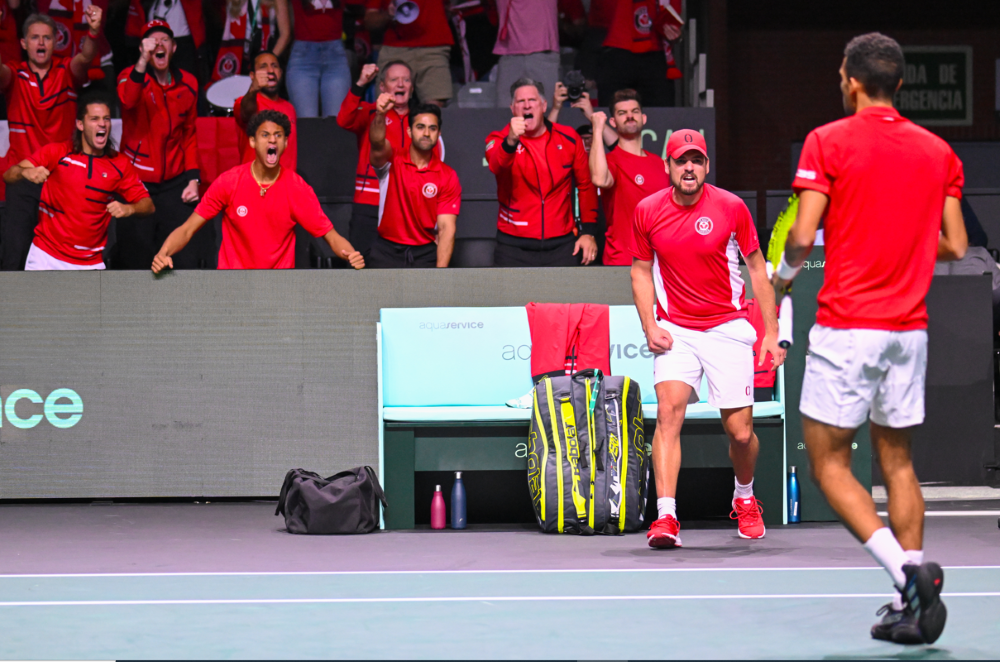
Those remarks by the articulate Auger-Aliassime were made during a rowdy victorious media conference amid teammates who appeared as if they had coiffed a brew – or two. Whatever the case, everyone was in a high-spirited mood, including the two alternate players – Alexis Galarneau and Gabriel Diallo. Galarneau, 23 from Laval, Que., was asked about he and Diallo being the ‘good luck charms’ cheerleading from the Canadian courtside seats. Laughing hard, he could barely get any words out with his hoarse voice. A slightly more loquacious Diallo, 21 from Montreal, said, “we have no more voice, we left it all on the bench. Obviously, I’m super grateful to be part of this team. We’re so proud of Vasek and Denis and Félix for leaving their hearts on the court. The way they competed was absolutely inspirational.”
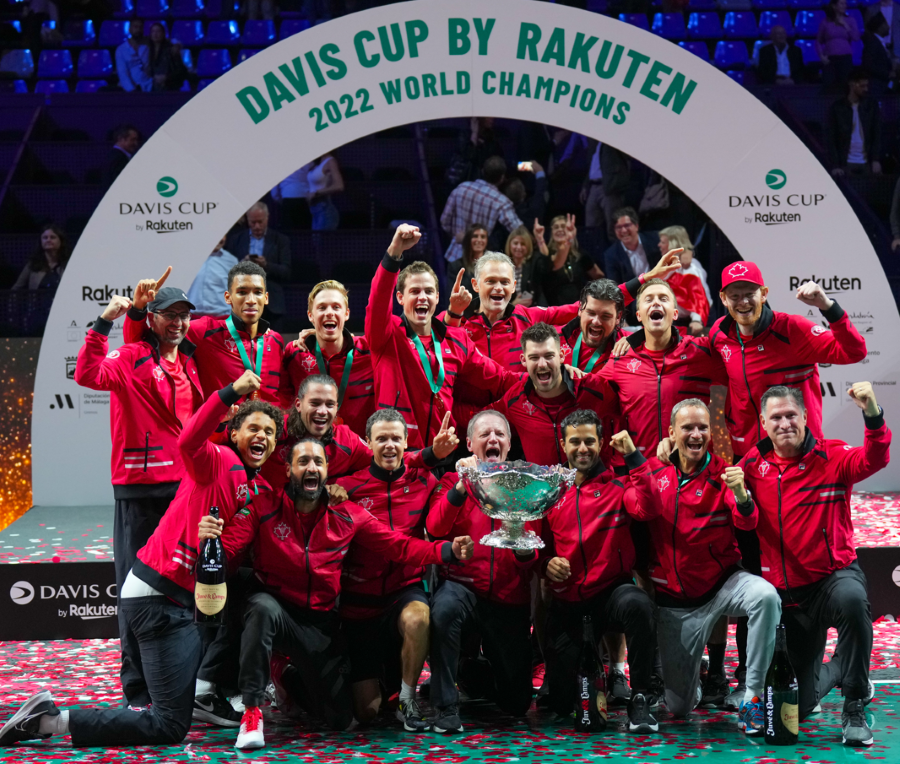
When ebullient captain Frank Dancevic was asked what the celebration would be like, he responded, “we haven’t thought about that yet but I can assure you it’s going to be a really big one – and WE’RE DEFINITELY NOT GOING TO SLEEP UNTIL THE FLIGHT AT 6 A.M. It’ll be a team effort. We’re going super hard. You know those big champagne bottles on court? – we’re planning to get bigger ones tonight.”
Dancevic and his team deserve to celebrate after playing three ties in four days – a 2-1 victory over Germany and 2-1 versus Italy before Sunday’s 2-0 coup de grace against Australia.
In a more serious vein, the captain summed up, “we faced a lot of obstacles this week – we were down in many matches. But we had our spirits high and we kept fighting until the end. We’re here now with the trophy. So it’s an incredible feeling.”
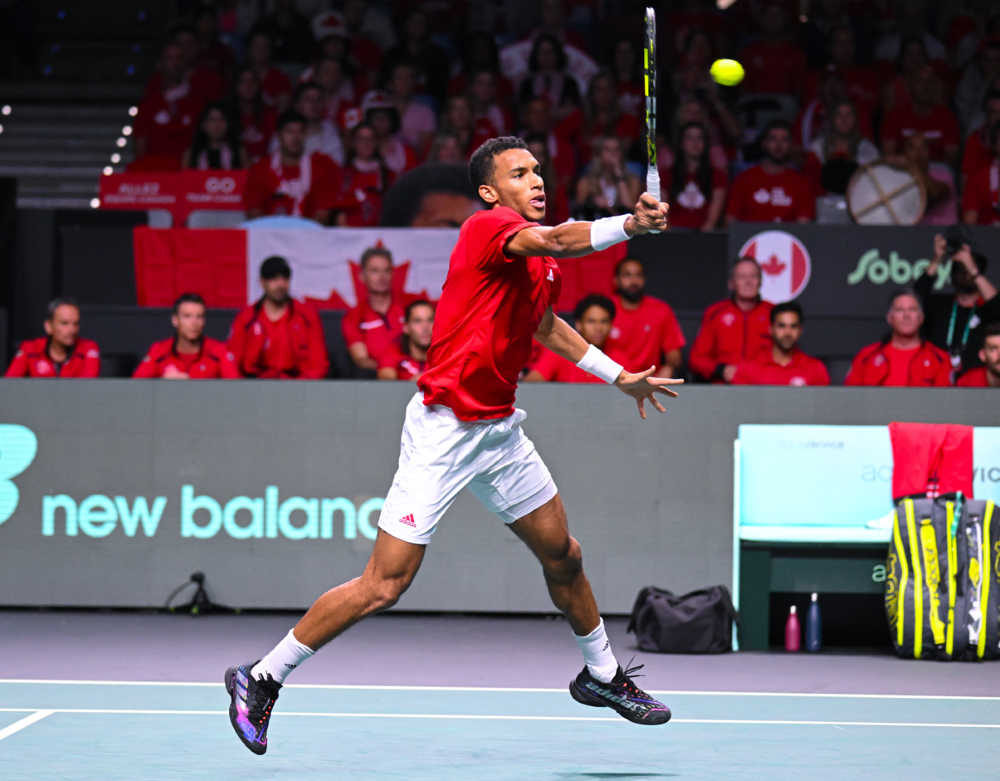
It’s impossible to report on the Canadian victory, becoming the 16th nation to win the championship in the Davis Cup’s 123-year history, without acknowledging Auger-Aliassime’s brilliance. Again on Sunday in his tie-clinching 6-3, 6-4 victory over Alex de Minaur, he was steely-nerved and clutch. The 23-year-old Aussie is about as tenacious and no-quit a competitor as can be found on tour. He and his mates had a day off on Saturday while Auger-Aliassime was busy keeping Canada’s hopes alive winning in singles and doubles against Italy. Auger-Aliassime surely had to be playing on end-of-season fumes against an opponent who is as quick around the court as anyone – a difficult guy to put away both in a rally and in a match.
It would have been dangerous to get behind the gritty de Minaur, and have to play catch-up. But Auger-Aliassime managed to avoid that, saving two break points in the very first game and then another one in the third. He successfully defended all eight break points he faced on the day, with the most memorable being three from love-40 when he led 3-2 in the second set. Point-by-point they were (1) hitting full-out in an amazing, ball-crushing rally with de Minaur chasing side to side before Auger-Aliassime finally won it when the Aussie missed a forehand into the net. The next two points were less dramatic, (2) a service winner and (3) a serve and forehand winner.
Auger-Aliassime didn’t have his best day serving but his compete level was enough to get him through. “I felt good,” he said. “You’re playing for the country, you’re playing for the team. I felt good physically – it’s not like I’m injured or anything. In terms of being tired, I can be tired tomorrow but not today. I was ready for anything. You have to be ready to go out and fight – take the lead and keep it.”
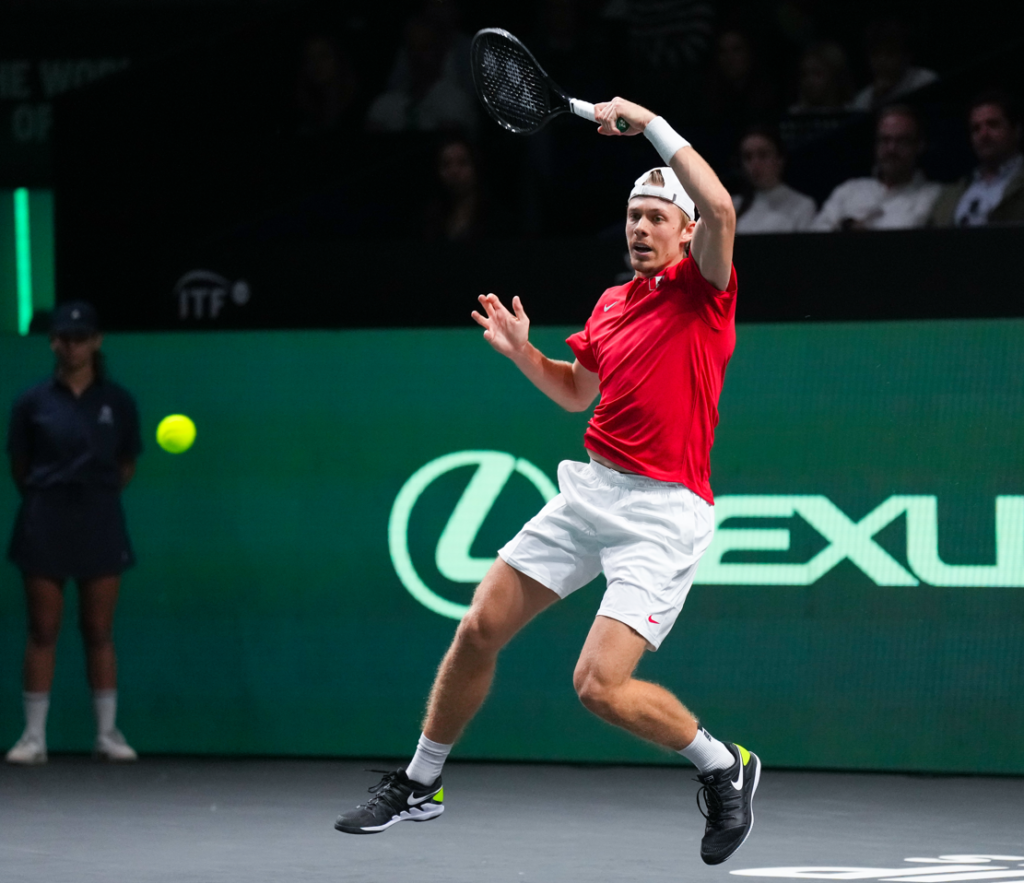
Shapovalov was equally impressive in the day’s opening match – a one-sided 6-2, 6-4 victory over Thanasi Kokkinakis. He grabbed a 4-0 lead right from the start and wrapped up the opening set in 32 minutes. In the second set, he broke to 2-1 and things really only got a trifle dicey after he led by two breaks at 5-2. Kokkinakis broke serve to 5-3 and held to 5-4. But then Shapovalov put a big exclamation mark on what was an impressive, measured performance – serving out to love and finishing with a serve/forehand-winner combo. He notably reined in some of his more ambitious impulses but still hit 23 winners to five for the 26-year-old Aussie.
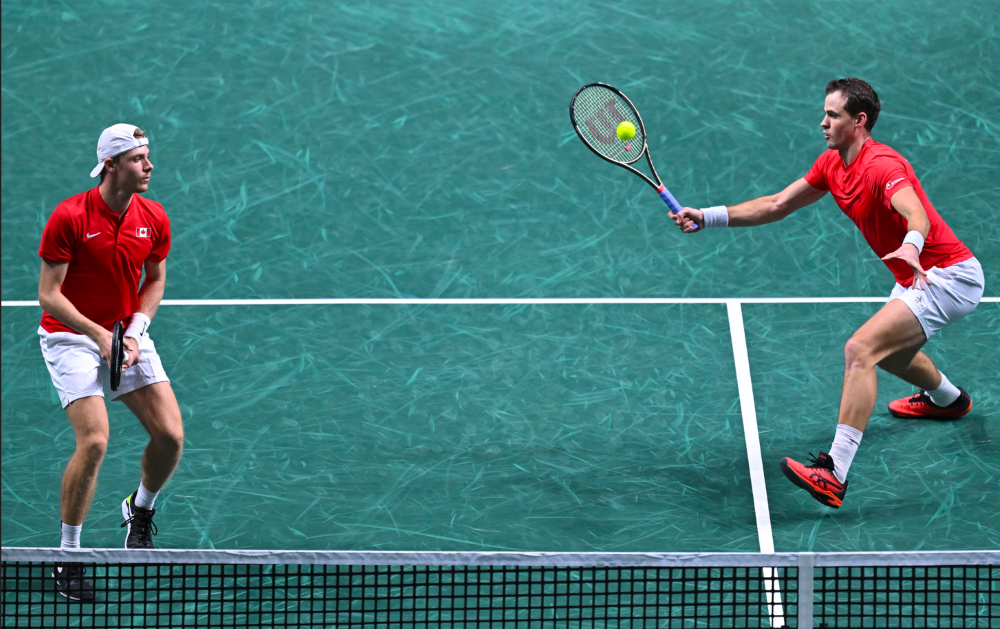
Looking back overall at the week, Shapovalov mentioned his 2-6, 6-3, 6-3 win with Pospisil over Germans Tim Puetz and Kevin Krawietz on Thursday as a highlight. “Obviously the doubles with Vasek in the quarter-finals against Germany was massive,” he said. “Against an undefeated (Davis Cup) team, coming back from a set down, we just completely lit it up. It was crazy, crazy. We didn’t miss a ball for a while there. It was like an out-of-body experience. It was crazy.”
Shapovalov also revealed that he will be maintaining his coach relationship with Peter Polansky in 2023.
From the Australian side of the ledger after Sunday’s final, a downcast Kokkinakis said he was short on match play. He even suggested Jordan Thompson, who played well with Max Purcell in a key doubles victory over the Croats on Friday, might have been a better option.
And when captain Lleyton Hewitt and de Minaur were questioned about why mercurial, No. 22-ranked Nick Kyrgios was not playing for Australia, they sang from the same songbook. “You’ll have to ask him,” Hewitt said. “I couldn’t try any harder.” Added de Minaur, “I’ve tried as well. It just wasn’t meant to be.”
There has been a lot of chatter about whether Canada deserved to even be in the Davis Cup Finals after losing in the Qualifiers first round – and seemingly being eliminated – last February in the Netherlands.
Obviously, Canada caught a break when Russia was banned and it got a spot (based on its No. 6 ranking) in the Davis Cup Finals group stage last September. But neither Auger-Aliassime nor Shapovalov played in that tie against the Dutch and so it was hardly an indication that Canada wasn’t a worthy team. Its second chance was very much like a lucky loser on the regular ATP Tour – and lucky losers have frequently been known to do well. Canada simply took advantage of its opportunity.
Host nations sometimes get wild cards in Davis Cup and Billie Jean King Cup – an exceptional circumstance. Russia invading Ukraine and being expelled from Davis Cup was also an exceptional circumstance that resulted in Canada’s second chance – an invitation that it could not be expected to decline.
And currently Canada probably only ranks behind Spain (Alcaraz and Nadal) and the banned Russians (Medvedev and Rublev) in terms of a potent line-up with quality players.
From another angle, Canada can probably thank Jack Draper for its being able to win the Davis Cup. Had the 20-year-old Brit not beaten Auger-Aliassime in the second round of the US Open, the 22-year-old from Montreal might have made a good run in New York and not changed his mind and played the Davis Cup Finals group stage in September – enabling Canada to qualify for this past week’s Finals in Malaga.
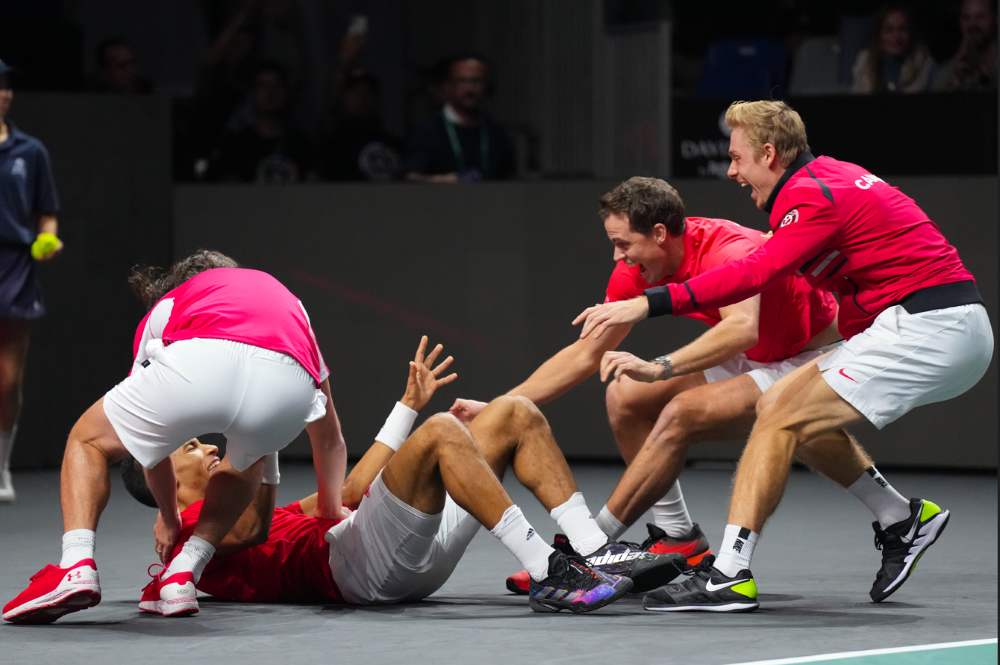
With the victory, Canada and runner-up Australia, will now get directly into the Davis Cup Finals group stage next September – and will not have to play in the home-and-away Qualifier ties the first week of February after the 2023 Australian Open.
Auger-Aliassime said he has not finalized his plans for the weeks leading into January’s Aussie Open. But one thing is for certain – when he arrives Down Under he will have a new aura about him after leading his nation to its Davis Cup triumph.
It’s fair to say that the 15-year-old boy who won the junior Davis Cup, alongside Shapovalov and Benjamin Sigouin, in Madrid in 2015 now has a much different stature. His success this fall – three tour titles, that No. 6 world ranking and the Davis Cup – are evidence of his maturation as a man and as a professional athlete.
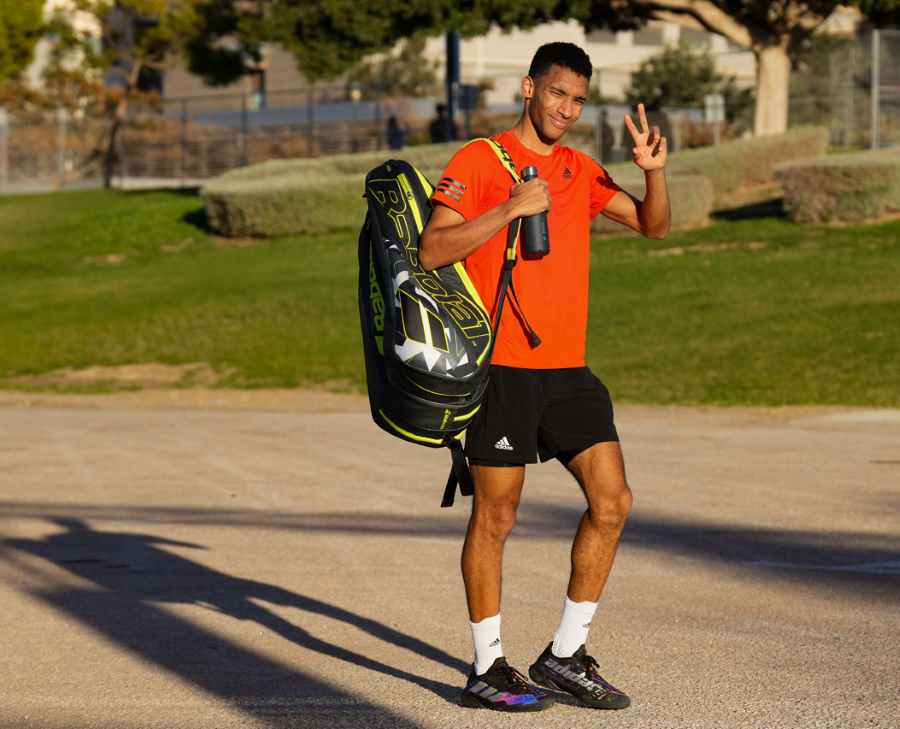
NOTE: Unfortunately, weather knocked out satellite reception of the feed of the Auger-Aliassime – de Minaur match for Canadian television on Sunday – meaning the home folk missed the final 3 ½ games of the historic Davis Cup victory.
Feature Photo: Martin Sidorjak


